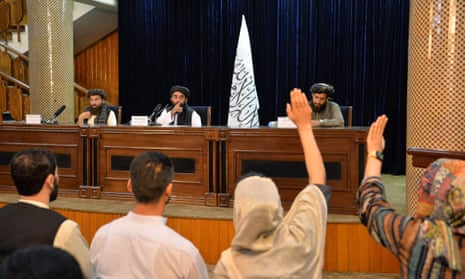Female journalists in Afghanistan are being forced out of jobs and told to stay at home despite Taliban promises to allow them to keep working and to respect press freedom, according to a report.
Reporters Sans Frontières (RSF) says it believes fewer than 100 of Kabul’s 700 female journalists are still working and only a handful are continuing to work from home in two other Afghan provinces. Others have been attacked and harassed.
By shutting down female voices in the media, the Taliban are in the process of silencing all the country’s women, it says.
Since the Taliban took over the country on 15 August, a survey by RSF and its partner organisation, the Centre for the Protection of Afghan Women Journalists (CPAWJ), found most female staff in media organisations, including journalists, have stopped working.
Kabul’s 108 media organisations employed 4,940 staff in 2020 including 1,080 females, 700 of them journalists. RSF reported that of the 510 women who used to work for eight of the biggest private companies, only 76 – including 39 journalists – are still at work. The situation is similar in the provinces, where almost all privately owned media outlets stopped operating as the Taliban advanced.
“A handful of these women journalists are still more or less managing to work from home, but there is no comparison with 2020 when a survey by RSF and the CPAWJ established that more than 1,700 women were working for media outlets in three provinces (Kabul, Herat and Balkh) in the east, west and north of the country,” it reported.
“Taliban respect for the fundamental right of women, including women journalists, to work and to practise their profession is a key issue,” the RSF secretary general, Christophe Deloire, said.
“Women journalists must be able to resume working without being harassed as soon as possible, because it is their most basic right, because it is essential for their livelihood, and also because their absence from the media landscape would have the effect of silencing all Afghan women. We urge the Taliban leadership to provide immediate guarantees for the freedom and safety of women journalists.”
Days after entering the Afghan capital, Taliban forces recently barred Khadija Amin and Shabnam Dawran, presenters with the public broadcaster Radio Television Afghanistan, from working at the station’s offices. Amin was replaced by a male Taliban official.
America’s Committee to Protect Journalists called on the Taliban to stop harassing and attacking journalists.
“Stripping public media of prominent women news presenters is an ominous sign that Afghanistan’s Taliban rulers have no intention of living up their promise of respecting women’s rights, in the media or elsewhere,” Steven Butler, CPJ’s Asia programme coordinator, said.
“The Taliban should let women news anchors return to work, and allow all journalists to work safely and without interference.”
A spokesperson for RSF told the Guardian the organisation was still hoping to get female journalists and those working with media organisations out of the country.
“It is a catastrophic situation, but we’re not despairing and still hoping we can do something to get them out. This wasn’t our original intention, but we are keeping an eye on the situation,” they said.
RSF said despite undertakings from the Taliban spokesman Zabihullah Mujahid that women would be able to “return to work in a few days”, no measure to this effect has been announced, forcing hundreds of women journalists to stay at home, facing an uncertain future.
On 24 August, the UN high commissioner for human rights, Michelle Bachelet, said: “A fundamental red line will be the Taliban’s treatment of women and girls, and respect for their rights to liberty, freedom of movement, education, self-expression and employment, guided by international human rights norms.”










